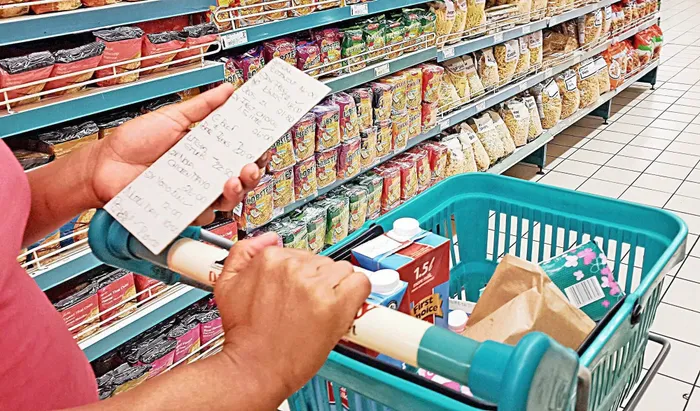SARB expected to hike rates despite cooling inflation in June

The annual inflation for food and non-alcoholic beverages slowed for the third successive month, cooling to 11.0% from a high of 14.0% in March. Picture: David Ritchie (ANA)
Financially-constrained consumers may have to contend with a further increase in the cost of borrowing as the South African Reserve Bank (SARB) is tipped to keep interest rates elevated in spite of inflation falling to its lowest in 20 months in June.
Data from Statistics South Africa (StatsSA) yesterday showed that annual headline inflation cooled to 5.4% in June from 6.3% in May, dragged lower by fuel and food prices.
Inflation in June sank below the upper limit of the SARB target range of 3-6% for the first time since April 2022, and was the lowest reading since October 2021 when the rate was 5.0%.
However, inflation is still higher than the 4.5% mid-point of the target preferred by the SARB’s Monetary Policy Committee (MPC).
Consumers have been looking to the SARB to start tapering its monetary policy as inflation has been slowing down after 10 cumulative hikes of 4.75 percentage points since November 2021.
These consecutive increases have made the monetary policy too restrictive, bringing the repurchase rate to its highest in 14 years at 8.25% per annum, and the prime lending rate to 11.75%.
However, a majority of economists yesterday were of the view that the SARB will not start cutting interest rates just yet, but will either implement a small increase one last time in this cycle or keep them unchanged.
Anchor Capital investment analyst Casey Delport said despite the positive news stemming from this latest inflation print, they were still expecting the SARB to hike the repo rate by 25 basis points today.
“Whilst this latest dip in inflation back into the SARB’s target range of 3-6%, the MPC will remain concerned by the ever present rand-negative risks currently at play within the economy, in addition to inflation expectations still exceeding the bank’s preference, even though wage pressure remains contained,” Delport said.
“We believe that the SARB will only likely look at cutting rates in the second half of next year, despite having the scope to do so earlier - given monetary policy is already in restrictive territory.”
The 0.9 of a percentage point drop in headline inflation between May and June was the largest decline since May 2020, when the rate also declined by 0.9 of a percentage point.
Inflation on transport tumbled from 7.0% in May to 1.8% in June after the price of petrol decreased by 71 cents per litre and diesel by between 80 cents and 84 cents in June.
The annual inflation for food and non-alcoholic beverages slowed for the third successive month, cooling to 11.0% from a high of 14.0% in March.
Surveyed inflation expectations have, as a whole, in fact increased further since the last MPC meeting in May.
Standard Bank economist Elna Moolman said a single dataset like this typically did not have a material bearing on the MPC’s decisions even when it represented an important milestone like dipping back into the target range for the first time in more than a year.
Moolman said while they foresee a possible further easing in the next inflation dataset for July, they were expecting inflation to drift in the top third of the target range for the next year.
“The SARB will likely remain uncomfortable with inflation expectations, which not only remain higher than the bank prefers but, more importantly, increased again in the latest BER survey,” she said.
“We still pencil in another 25 basis points rate hike at this week’s MPC meeting, but it is a very close call and there is a possibility that the bank will pause instead.”
On a monthly basis, however, inflation increased by 0.2% in June.
The economy is currently experiencing cost-push inflation as opposed to demand-pull inflation, which means that inflationary pressures were coming from the supply side rather than the demand side.
Other analysts cautioned that another interest rate hike was not the answer when the country is trying to protect the rand’s value, and would be catastrophic for consumers.
Nedbank economist Johannes Khosa said they were expecting one last 25 basis points rate hike today before the release of June’s inflation print as the MPC may be cautious given the uncertainties surrounding load shedding and the rand.
However, Khosa said yesterday’s numbers strengthened the case for no further hikes.
“The better-than-expected outcome comes on top of the rand’s pullback to below R18 to the US dollar, a faster deceleration in US inflation, and more evidence of slowing global and domestic demand,” Khosa said.
“Tomorrow's rate decision will still be a close call, but inflation's return to the target range increases the probability that the MPC will leave interest rates unchanged, which could be the peak in the rate cycle.”
BUSINESS REPORT